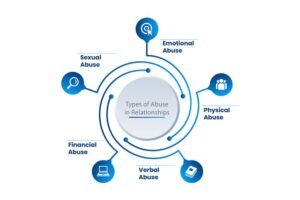A mentally abusive relationship may look loving from the outside, but inside, it feels like walking on eggshells every day. The one dominates, manipulates, and destroys the spirit of the other, either with words, no words, or even guilt. With time, you begin doubting yourself, your thoughts, and even your reality. The abuser manipulates emotional power and thus makes you feel insignificant and reliant, and you are caught up in perplexity and fright.
Similarly, it is not merely the issue of anger or fights; it is the question of control and domination masquerading as love. Being aware of such signs will be the initial step to freedom and recovery. Nobody has the right to live in fear or constantly suffer emotionally. You can be strong enough to escape and have your confidence, peace, and happiness again.
What Is an Abusive Relationship?
An abusive relationship is a habit of unhealthy actions by one individual to dominate the other. This is not all about physical combat. It may include one saying words that are hurtful to you, demeaning to you, or meaningless, so that you feel worth nothing. The individual may attempt to dictate how you spend your money or even access your phone without you. It is not the first time or a single argument, but a cycle that tends to get even better over time.
Moreover, healthy relationships cause you to feel safe, respected, and supported. You are usually frightened, baffled, and alone in an abusive relationship. The abuser might attempt to lay blame on you regarding the actions, or will assure you that they will change. This is a way of controlling your emotions and retaining you within the relationship. It is important to keep in mind that all people have a right to be in a relationship that develops them, not one that isolates and damages them by suppressing them.
Signs of Abuse in Relationships
- Resistant criticism, calling names, or humiliation that devalues self-worth.
- Managing behavior, like tracking your phone, messages, or your whereabouts.
- Separation from friends, family, or social life to have full control.
- Often changing moods, anger, or threats that produce fear and anxiety.
- Financial dominance, such as robbing or limiting the use of resources.
- Disregarding your feelings, opinions, or personal limits.
- Making you feel vulnerable or useless without their consent.
Is Yelling in a Relationship Abuse?
You might think: Am I in an abusive relationship? Shouting in a relationship is a type of abuse, particularly where it turns into a habitual method of communicating. Similarly, people lose their temper occasionally, and constant screaming causes an atmosphere of fear. When another individual resorts to shouting to control, intimidate, and belittle another, then it is no longer an argument. This type of behavior is likely to cause you to feel small, nervous, and always anxious. It is not a good approach to conflict resolution, and it may ruin your self-esteem in the long run.
Furthermore, yelling often, with the intent to inflict emotional pain, is one of the indicators of an abusive relationship of a mentally abusive nature. This is done to control you and make you feel helpless. An understanding partner ought to dispute amicably with the other partner, not to fight off with their voice. When yelling is also a component in a bigger scheme of control, insults, threats, etc., then it certainly is a type of emotional abuse.
Types of Abuse in Relationships

1.Emotional Abuse
Emotional abuse occurs when one of the partners takes control of the other by words or other means that harm the other party. It entails unceasing criticism, blame, or control. The person with an addiction attempts to make their partner feel insignificant or reliant. This form of abuse is gradually harmful as it destroys confidence and trust. It brings emotional trauma that can be healed after some time.
2.Physical Abuse
Physical abuse entails hitting, slapping, pushing, or any form of action that results in harm. The abuser employs violence to manipulate or intimidate their partner. Fear becomes the order of the day in the relationship. This form of abuse may have a huge negative effect on both the body and the mind.
3.Verbal Abuse
Verbal abuse is used to mean shouting, name-calling calling or harsh words that are used to insult or control. The abuser speaks in a way that would make their partner feel small or afraid. They may degrade them either privately or publicly. Verbal insults at all times ruin self-esteem and instill fear. It has a strong influence on emotional and mental health.
4. Financial Abuse
Financial abuse happens when one partner locks the money or prevents the other partner from accessing the money. The abuser can either misuse the income of their partner or deprive the partner of a job. This domination maintains the victim as being in need and helpless. Money exploitation ensures individuals get into unhealthy relationships. It deprives one of freedom and independence.
5. Sexual Abuse
Sexual abuse involves the use of force or compulsion to get someone to have sex. It may occur in any relationship, even in marriage. The abuser governs or controls by using intimacy. Victims tend to be afraid, ashamed, and confused. This kind of abuse is emotionally and physically harmful.
Abusive Relationship Cycle
How To Get Out of an Abusive Relationship? Let’s find here! The abusive relationship cycles occur when one partner always dominates, manipulates, or abuses the other partner. The cycle usually starts with the tension that is caused by arguing, blaming, or emotional distancing. Therefore, the abuser thereupon exits, angry, insulted, or even violent. They then end up repenting, apologizing, or promising to change. This false hope that leads people is a result of this little rest period; false hopes that this situation will improve, only to restructure the tension once again, and the chain repeats itself.
In addition, physical abuse may turn out to be as painful as emotional abuse in a mentally abusive relationship. The abuser will feel like controlling the thoughts and actions of his partner by means of fear, guilt, or manipulation. They shame, isolate, or frustrate their partner to the point where the victim starts doubting their self-worth. Thus, the solution to the termination of this cycle is to determine the abuse, set limits, or seek professional help.
Reasons for Physiological Abuse in Relationships
The following reasons cause psychological abuse:
- The abuser desires to have complete control and power over his partner.
- They are insecure, and they attempt to be in control to feel stronger.
- Their behavior is influenced by childhood trauma or past abuse.
- They love being the center of attention and power in all circumstances.
- Low self-esteem causes them to inflict pain on others to be significant.
- They employ manipulation to make their partner frightened or reliant.
- They are evasive and will attribute their issues to their partner.
Examples of Abusive Relationships
Its examples are the following:
- A partner is always critical/insulting to lower self-esteem.
- A partner obtains fear or employs force to achieve obedience and fear.
- One of the partners involves guilt or manipulation to make decisions.
- The abuser will separate their partner from family and friends.
- One of the partners coerces or compels the partner into sexual activities.
- The person with an addiction accuses their mate of all relationship ills.
- The abuser employs love or silence to manipulate feelings and actions.
How To Leave an Abusive Relationship?
- Know that what your partner does does not make you the blame, and it is not healthy either.
- Give thought to the process that you must undertake to get away safely. This concerns the destination and the load that you are carrying.
- Prepare ID, birth certificate, bank cards, and any other legal documentation.
- Contact a domestic violence hotline. They offer free and confidential advice and referral to local resources.
- It is necessary to leave at a time when your partner is not present. The first one is your safety.
- Annex their number, social media, and email after departure. To all their attempts to reach you, do not answer.
Healing From an Abusive Relationship
Resilience to come out of abusive traits in relationships requires time and strength. Begin by accepting the fact that it is not your fault. You have to let yourself experience what you are feeling. Have friends who believe in you and love you. Share your experiences with a close friend, counselor, or therapist. Attend to daily practices that enable you to remain relaxed and centered, such as journaling, exercising, or being outside.
Moreover, restoring trust is a great element of recovery. Keep small targets and pat yourself on the back on a daily basis. Instruction: Learn how to be able to trust your own judgment and make decisions that will not violate your peace. Take care of yourself and remember that you are worthy of appreciation and love. Hence, it might be a long journey, yet one step moves you further and more self-reliant.
Treatment For Abusive Relationships
1-Treatment for Victims in Abusive Relationships
Abuse victims require comfort, security, and recovery. The initial one is to be aware of the abuse and seek assistance. Hotlines, therapy, and support groups provide support and emotional support. Counseling aids victims to regain confidence, boundaries, and get over the traumas. Professional support, a trusted relationship, and self-care are significant to recovery.
2-Therapy for Abusers in Abusive Relationships
Abusers should also undergo therapy to learn to overcome their bad habits. Counseling can help them identify their anger, lack of control, and poor thinking patterns. The therapists also work with the abusers to build empathy and acquire good ways of communicating. Behavior therapy and anger management prevent the cycle of abuse. The true process begins when the abuser accepts the blame for their actions.
3-Couples Therapy After Abuse
Therapy for couples only works in cases where both partners feel safe and when the abuse has been fully abandoned. The aim is to restore trust, enhance communication, and establish healthy boundaries. The therapists help the couple to comprehend control and emotional abuse patterns. Every individual learns to add emotions without being fearful. Renaissance requires time, integrity, and respect.
End Note
A mentally abusive relationship gradually destroys the confidence, independence, and peace of mind of a person. It involves control, manipulation, criticism, and emotional abuse that leaves the victim feeling trapped. Recognizing the abuse is the initial step towards liberation. One way of eliminating it is to establish a strong boundary, find support from people you trust, and consult with a mental health specialist.
Likewise, therapy gives you back your self-esteem and how to deal with the emotional trauma in healthy ways. The journey to Healing requires some guts, and every journey to self-respect brings one a good life. To find out more and insights on mentally abusive relationships and how to break out of them, help and valuable information can be offered by Mental Behavioral, which provides awareness and useful information on mental health and recovery.
FAQs
How does a relationship with a narcissistic abuser appear?
Narcissistic abuse occurs when one of the partners constantly strives to gain control, attention, and praise. They disregard you, accuse you of wrongs, and make you feel doubtful. The association is one-sided and emotionally exhausting.
What can be considered examples of relationship abuse?
These can be constant criticism, control, manipulation, isolation, and physical harm. It may also be one of controlling money, threats, or ignoring emotions. Abuse includes any action that brings fear or deprivation of liberty.
What does the 70/30 rule mean in a relationship?
The 70/30 rule implies that effort is put in by both partners, only not necessarily to the same degree. It is possible to contribute 70 percent, and the other 30 percent at one time. A healthy relationship balances such an endeavor with time in the form of care and understanding.
At what point is it considered emotional abuse?
It turns into emotional abuse when one of the partners manipulates, offends, or influences the other. Most of the time, you may be scared, guilty, or useless. The loss of your emotional safety is emotional abuse.








